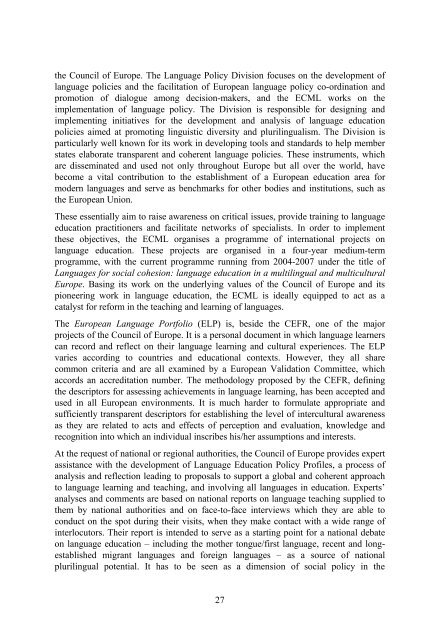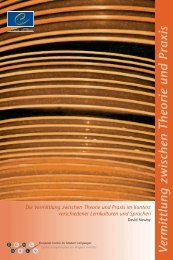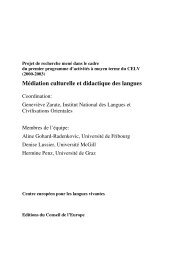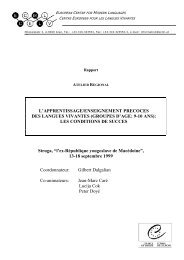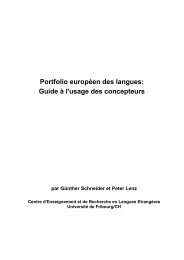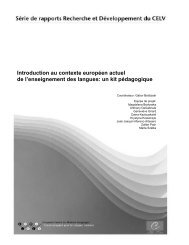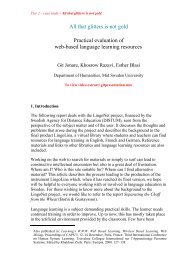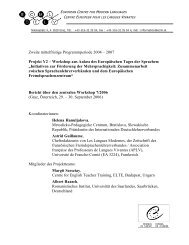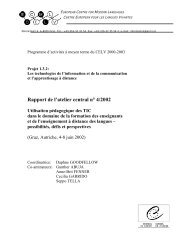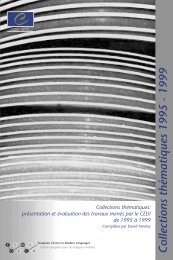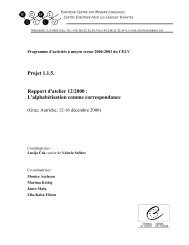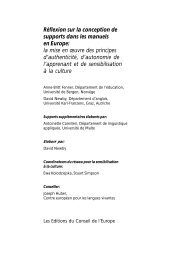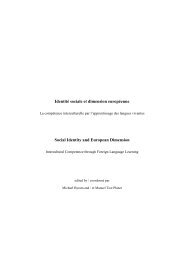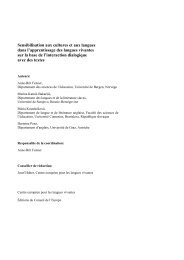cohesion - European Centre for Modern Languages
cohesion - European Centre for Modern Languages
cohesion - European Centre for Modern Languages
Create successful ePaper yourself
Turn your PDF publications into a flip-book with our unique Google optimized e-Paper software.
the Council of Europe. The Language Policy Division focuses on the development of<br />
language policies and the facilitation of <strong>European</strong> language policy co-ordination and<br />
promotion of dialogue among decision-makers, and the ECML works on the<br />
implementation of language policy. The Division is responsible <strong>for</strong> designing and<br />
implementing initiatives <strong>for</strong> the development and analysis of language education<br />
policies aimed at promoting linguistic diversity and plurilingualism. The Division is<br />
particularly well known <strong>for</strong> its work in developing tools and standards to help member<br />
states elaborate transparent and coherent language policies. These instruments, which<br />
are disseminated and used not only throughout Europe but all over the world, have<br />
become a vital contribution to the establishment of a <strong>European</strong> education area <strong>for</strong><br />
modern languages and serve as benchmarks <strong>for</strong> other bodies and institutions, such as<br />
the <strong>European</strong> Union.<br />
These essentially aim to raise awareness on critical issues, provide training to language<br />
education practitioners and facilitate networks of specialists. In order to implement<br />
these objectives, the ECML organises a programme of international projects on<br />
language education. These projects are organised in a four-year medium-term<br />
programme, with the current programme running from 2004-2007 under the title of<br />
<strong>Languages</strong> <strong>for</strong> social <strong>cohesion</strong>: language education in a multilingual and multicultural<br />
Europe. Basing its work on the underlying values of the Council of Europe and its<br />
pioneering work in language education, the ECML is ideally equipped to act as a<br />
catalyst <strong>for</strong> re<strong>for</strong>m in the teaching and learning of languages.<br />
The <strong>European</strong> Language Portfolio (ELP) is, beside the CEFR, one of the major<br />
projects of the Council of Europe. It is a personal document in which language learners<br />
can record and reflect on their language learning and cultural experiences. The ELP<br />
varies according to countries and educational contexts. However, they all share<br />
common criteria and are all examined by a <strong>European</strong> Validation Committee, which<br />
accords an accreditation number. The methodology proposed by the CEFR, defining<br />
the descriptors <strong>for</strong> assessing achievements in language learning, has been accepted and<br />
used in all <strong>European</strong> environments. It is much harder to <strong>for</strong>mulate appropriate and<br />
sufficiently transparent descriptors <strong>for</strong> establishing the level of intercultural awareness<br />
as they are related to acts and effects of perception and evaluation, knowledge and<br />
recognition into which an individual inscribes his/her assumptions and interests.<br />
At the request of national or regional authorities, the Council of Europe provides expert<br />
assistance with the development of Language Education Policy Profiles, a process of<br />
analysis and reflection leading to proposals to support a global and coherent approach<br />
to language learning and teaching, and involving all languages in education. Experts’<br />
analyses and comments are based on national reports on language teaching supplied to<br />
them by national authorities and on face-to-face interviews which they are able to<br />
conduct on the spot during their visits, when they make contact with a wide range of<br />
interlocutors. Their report is intended to serve as a starting point <strong>for</strong> a national debate<br />
on language education – including the mother tongue/first language, recent and longestablished<br />
migrant languages and <strong>for</strong>eign languages – as a source of national<br />
plurilingual potential. It has to be seen as a dimension of social policy in the<br />
27


